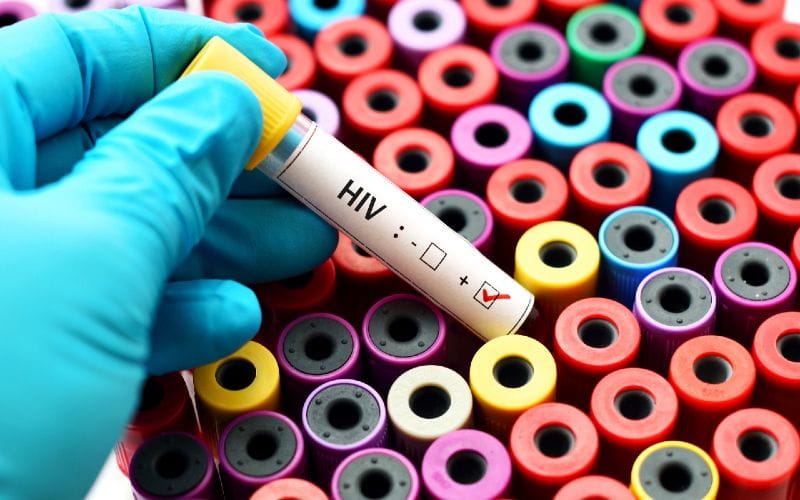World AIDS Day
Commemorating the pandemic that has shaped our community.

Each year, on 1 December, we mark World AIDS Day. It’s a tradition that began in 1988.
World AIDS Day is an opportunity for us all to highlight the importance of tackling HIV, to support everyone living with HIV, and to remember and commemorate everyone who has died from an AIDS-related illness.
Why does World AIDS Day matter?
Now that we’ve got the benefit of U=U and PrEP, which for many people has made HIV a much more manageable virus, it’s easy to lose sight of the work that still needs to be done on HIV.
Around the world, people are still acquiring HIV and people are still dying from AIDS-related illnesses.
Since HIV was identified in 1983, it has killed more than 35 million people.
World AIDS Day is an important opportunity for us to remind each other and the world’s governments that HIV is a continuing health issue that needs resources, research, and education.
How should I mark World AIDS Day?
There’s no right or wrong way to mark World AIDS Day – find something that feels meaningful to you. A lot of people will be wearing red ribbons – the sale of red ribbons is an important fundraising opportunity for charities and community organisations who work to tackle HIV and AIDS.
Getting an HIV test is also an important thing to do. Knowing your HIV status – and normalising regular testing – is a key step in stopping transmission of the virus and ensuring that people living with HIV are accessing medication.
Educate yourself on PrEP and U=U.
Watch a film to help deepen your understanding of our history with HIV.
Listen to some podcasts that explore how our community is continuing to navigate HIV and the aftermath of the AIDS epidemic.
What is AIDS?
AIDS is the name used to describe a range of illnesses that you can become susceptible to when your immune system has been damaged by the HIV virus.
We often talk about HIV and AIDS in the same breath – they’re two sides of one deadly coin.
It was in 1981 that the first victims of AIDS were identified in the US.
Since then, according to the agencies of the United Nations, more than 35 million people have died of AIDS-related illnesses.
For most of us, AIDS doesn’t really hit the headlines much anymore. We don’t yet have a cure, we don’t yet have a vaccine, but we do have effective treatment and we do have a pre-exposure prophylaxis.
We have the tools required to prevent the transmission of HIV. We have the tools required to prevent anyone dying from AIDS.
While we have the tools to stop transmission and to stop people dying, people are still acquiring HIV and people are still dying of AIDS-related illnesses. So, where’s the disconnect?
What’s missing is the political will to allocate the resources required to stop the transmission of HIV around the globe.
UNAIDS is the Joint United Nations Programme on HIV/AIDS. This is the agency that has been tasked by the United Nations to end the AIDS pandemic by 2030. UNAIDS is coordinating the programs required to get us to the goal of zero new HIV infections, zero discrimination, and zero AIDS-related deaths.
We need to continue to advocate for the resources required to make this a reality.
What is PrEP?
PrEP stands for pre-exposure prophylaxis. PrEP is a tool that HIV-negative people can use to avoid acquiring HIV. Essentially, it’s taking medication that protects you against HIV infection.
It was in 2012 that the World Health Organisation endorsed the use of antiretroviral medication – which is used to treat someone who has HIV – as a pre-exposure prophylaxis to prevent people from acquiring the virus.
Truvada was the brand that was first available for use as PrEP, but there are now generic versions of the medication also available.
When PrEP first became available, it was approved for use on the basis that it should be taken daily to ensure protection. However, the research now indicates that on-demand dosing is just as effective for anal sex.
How do I get PrEP?
The availability of PrEP will vary depending on where you are. Some countries have made PrEP available free-of-charge to people at risk of acquiring HIV, in other countries it is only available if you purchase it privately.
As a first step, speak with your doctor or sexual health service. They will be able to advise whether PrEP is available on prescription. If it’s not available through your health service, there are options available to purchase online.
How effective is PrEP?
The CDC – Centers for Disease Control and Prevention in the US – advises that PrEP reduces the risk of acquiring HIV from a sexual encounter by more than 90%.
A major research project – the iPrEx Study – found that PrEP was up to 99% effective.
The San Francisco AIDS Foundation and the San Francisco Department of Public Health advise that PrEP provides 92%-99% reduction in HIV risk.
If we compare the effectiveness of PrEP versus condoms, research indicates that condoms are somewhere between 70%-92% effective in preventing the transmission of HIV – if they are used correctly and do not break. However, researchers have also found that condom usage errors – breakage, slippage, or incomplete use – occur in up to 40% of sexual encounters.
Undetectable = Untransmittable
Often referred to in the short-hand as U=U, what this means is that if someone has HIV but their medication has reduced their viral load to ‘undetectable’ levels, then they can’t transmit the virus to anyone else.
This is sometimes referred to as Treatment-as-Prevention, or TasP.
The importance of testing
Regular testing at your local sexual health service is important to ensure that you know your status regarding HIV, and that you’re keeping on top of any other Sexually Transmitted Infections – STIs – that you may be exposed to from time to time.
Testing is quick, easy, painless, and ensures that you’re fully equipped to keep yourself fit and healthy while enjoying an active sex life the way you want it.
How often should I get an STI test?
If you’re sexually active you should get tested at least once a year.
If you're not in a monogamous relationship and are having sex with hook-ups, dates, or random guys that you've only just met, then you should get tested more frequently.
The more frequently you get tested, the faster you'll be treated if you've picked up an STI. Frequent testing and early treatment can help to reduce the number of STIs circulating in our communities.
Where can I get an STI test?
Depending on where you live and how your health system operates, there may be different options available to you. As a general guide, you should be able to access an STI test in the following ways:
1. Your local doctor – often referred to as your General Practitioner, or your GP – will be able to complete the full range of STI testing for you.
2. Specialist sexual health clinics are a great resource. They are likely to provide a walk-in service, or you may need to make an appointment.
3. Home test kits. These are often available free-of-charge – they’re posted to you, you collect the samples yourself, and then post it back for screening. A few days later, you then get a text with the results.
What happens at an STI test?
Whether you’re being tested by a health professional, or doing the testing yourself, samples from your body need to be collected so that they can be tested for infection.
What you’ll need to provide is:
- a urine sample
- a blood sample
- swabs from your anus
- swabs from your throat
You might find this whole process a bit awkward and a bit embarrassing, but it doesn’t hurt and the more frequently you do it then the easier it gets.
What happens if I test positive for an STI?
There’s no need to panic. STIs can be easily treated and managed. The health professional who’s testing you will be able to advise about what steps you need to take if you return any positive results.
The earlier that any STIs are detected, the easier it is to treat them, and the easier it is to ensure that you’re not transmitting STIs to anyone else.

Should you disclose your HIV status in a relationship?
This is a slightly complicated topic because there’s some parts of the world that legally require you to disclose your HIV status, and others where you could be committing an offence if you "recklessly" expose someone to the virus.
From a health perspective – with the protections available through PrEP and TasP – there’s no specific reason why you need to disclose your HIV status unless you want to.
Having said that, in the interests of open and honest communication, it’s probably a good idea to share your HIV status in the context of talking about sexual health and health generally. For example, the conversation could go something like:
- Your boyfriend: “I have asthma, so I carry an inhaler.”
- You: “Cool, I have HIV, so I take medication for that. I’m undetectable.”
- “Your boyfriend: “That’s good that you’re undetectable. I’m taking PrEP so we’ve got that well and truly covered.”
Of course, if you encounter any HIV-related stigma in that kind of conversation, then that’s a bit of a red-flag for the relationship going forward. It’s always good to educate people who aren’t up-to-date with where we’re at with HIV, but it’s not a very sexy conversation.
What should you consider before disclosing your HIV status?
Thinking about STIs may not be at the top of your priority list when you’re in the early stages of what could be an exciting relationship, but it’s never a bad idea to check in with yourself about your sexual health.
When you’re first dating, it’s much more fun to talk about kinks and fetishes, your favourite type of porn, or maybe even talk about opening up your relationship for a threesome. Banging on about advances in treatment and prevention or going into graphic detail about your latest brush with gonorrhoea could easily be a boner-killer.
A good starting point is to make sure that you’re up-to-date with your STI testing. You need to know where you’re at with HIV and any other potential issues. That gives you a really firm foundation to share that information with your partner when that conversation happens.
How do you explain undetectable HIV to your partner?
If you are HIV-positive and undetectable, you’re probably well and truly over explaining what "undetectable" means. However, if you’re beginning a new relationship and the guy that you’re dating is HIV-negative, then you may need to help him get up-to-speed on the facts.
If you are HIV-positive and on effective medication, it’s likely – and can be confirmed by testing – that your viral load is undetectable. This means that you cannot transmit the virus to anyone else.
Obviously, you can be in a relationship and have sex with other people. Your partner may still choose to take PrEP. He knows that you won’t transmit HIV to him, but someone who is not undetectable might.
What if your partner is not ready to handle your HIV status?
If you disclose to your partner that you are HIV-positive and they are not ready to handle the information, that feels like a bit of a deal-breaker.
Your HIV status isn’t going to change. Sure, you could do your best to educate them and overcome the stigma that they’re associating with the virus, but that feels like a lot of work with no guarantee that it will be worth the effort.
